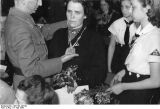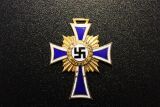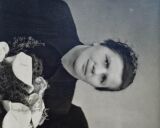back...Cross of Honour of the German Mother
The sight of a grisly murder of a child by the German occupant or death in a gas chamber was the tragic fate of many Polish mothers during WWII. The situation was quite different in the Third Reich, where German mothers with many children received the Cross of Honour of the German Mother (German: Ehrenkreuz der Deutschen Mutter) from Adolf Hitler.
Thanks to the kindness of Mr Franz Thiel, the grandson of Anna Mühlbauer – decorated with the Cross of Honour of the German Mother –the collection of the Museum now includes the Cross of Honour of the German Mother. It was a decoration presented by Adolf Hitler to German women with a large number of children. Presenting decorations for supporting the so-called master race was a part of the plan to create the Greater Reich, consisting of “racially pure Aryans”. The civil decoration honouring German mothers was established on 16 December 1938. It was awarded for the first time on 21 May 1939.
- Adolf Hitler found that not all mothers were worthy of this decoration. All non-Aryan women or women with physical or mental disabilities were disqualified first. The Cross of Honour of the German Mother was also not awarded to women whose children were stillborn or died in childhood– explains dr Ireneusz Piotr Maj, head of the Museum of Polish Children – Victims of Totalitarianism.
A German woman who passed the verification received the bronze, silver or gold cross, together with a certificate, a medal and a beret. The decorated woman was also entitled to precedence in offices and priority seating in public transport.
- You could receive the bronze cross for giving birth to at least four children. The silver medal was awarded to mothers of six or seven children, and in order to receive the gold cross, you needed to have at least eight children – says Anna Dudek, a Museum collection specialist.
The situation was quite different in occupied Poland. In September 1939, the life of millions of Poles changed radically. Women and men were forced to fight to survive under the yoke of the enemy. Women were left on their own, exposed to constant persecution and harassment by the occupant.
“Police came to our home constantly on various pretence, they searched the house, asked about my husband and children (…). I refused to sign the Volksliste, which drove the Germans crazy, and they threatened me, telling me I would not get away with it. My children were also persecuted at school, as the children of Polish pigs or Polish thugs” – recalls Monika Chrzanowska, the mother of Helena Mazur (née Chrzanowska) – a child prisoner of the German concentration camp for Polish children on Przemysłowa Street in Łódź.
Many Polish women were sent to concentration camps or forced labour in the Third Reich. Some of them were pregnant, but women who gave birth in the camps would not be able to enjoy the birth of their babies. The children were taken away immediately and brutally murdered in front of the terrified mothers. A small percentage of newborns were sent away for Germanisation.
Tragic fate also awaited older children, who were left alone after their parents had been arrested or murdered. Some of them were sent to the Third Reich for Germanisation, and they never returned to their Homeland from there. The rest were locked away in camps all over Poland or sent to forced labour in Germany.
One of the places the children were sent to was the German concentration camp for Polish children on Przemysłowa Street in Łódź. The German machine of terror was ruthless towards underage Poles. First, the children were deprived of their parents and then put in the camps for reasons such as vagrancy, food trading, smuggling or – as in the case of Jurek Rutkowski – due to a false allegation.
“(…) The tragic autumn of 1943 – 3 October – was the beginning of the most tragic chapter of my life – the period of suffering and despair, leaving a profound impact on the rest of the life of the then-young, 31-year-old mother of a 9-year-old child, brutally murdered in the camp for underage children in Łódź (…). I am waiting impatiently in front of the entrance to the camp for my son to come. Then, through the open gate, two boys are coming towards me, leading themselves by the hand. I see how one of them, the stronger one, leads his weaker friend, but I don’t recognise my son in any of them. They pass through the entrance, and they approach me. Suddenly, one of the boys, a gaunt figure, nothing but skin and bones, approached me and, with a weak voice in which I sensed joy, said “mummy”, and then I recognised him as my son. I was so shocked by the sight of my son, that I couldn’t say anything – I feinted” – recalls Halina Rutkowska, the mother of Jurek Rutkowski, former prisoner of the camp on Przemysłowa Street.



